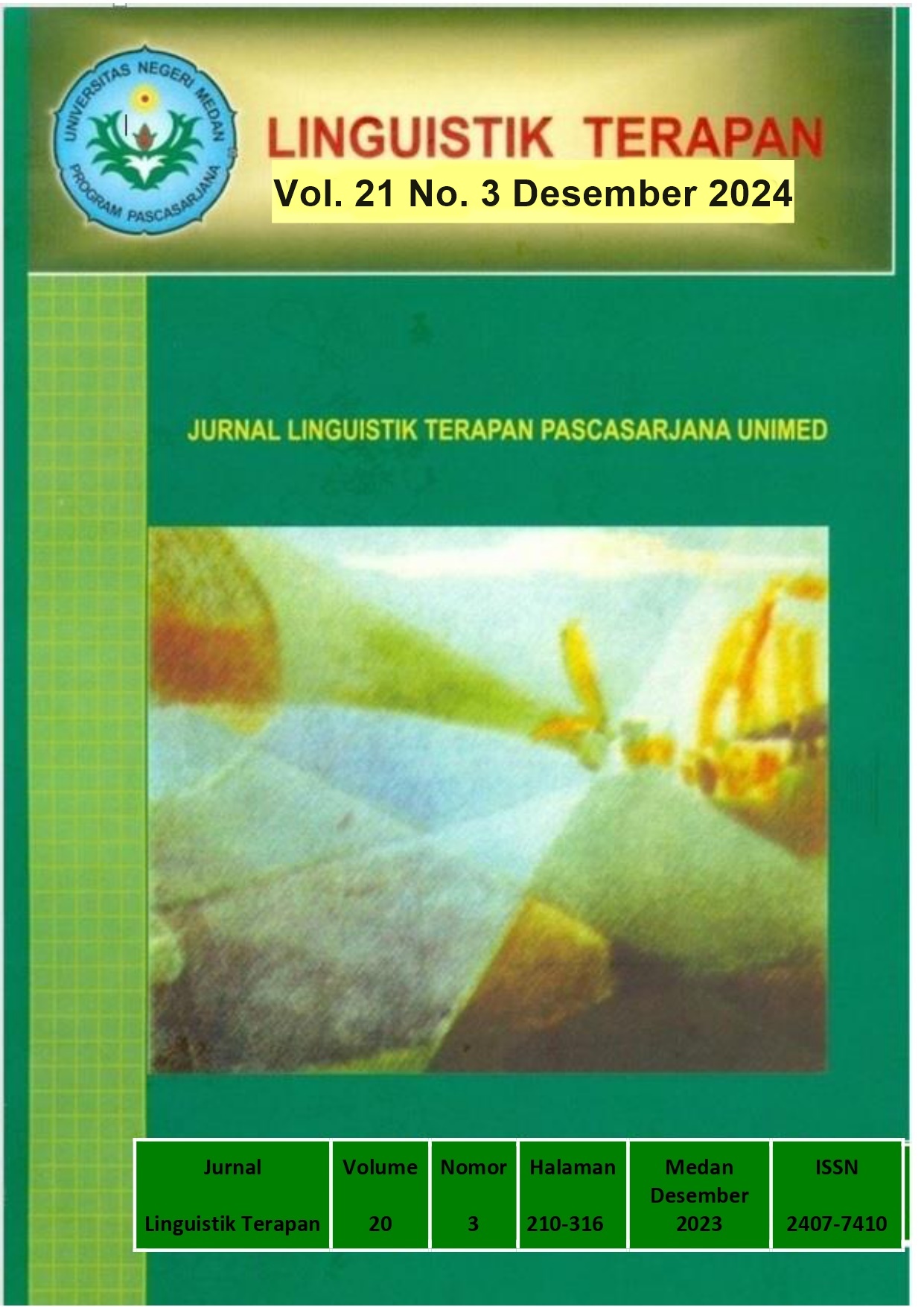Retracing the Past through Historical Fantasy Novel: The Poppy War
DOI:
https://doi.org/10.24114/lt.v21i3.64894Keywords:
Historical Fantasy, Historical Representation, Second Sino-Japanese War, The Poppy WarAbstract
Historical genre and fantasy genre each have its own ups and downs in their recognition and acceptation in the field of literature. This research explored the mixture of both of the genres, the historical fantasy genre. This research aimed to examine the historical representations and its authenticity in The Poppy War novel. The research was conducted by using the approach from McArthur (2008) related to the method on how to represent the past as a historical fantasy novel, as well as how authentic the historical representation by using the approach from Groce & Groce (2005). This research was done using qualitative research design in the form of textual analysis. The result showed that the novel used historical details and referred to historical figures and events as the ways of representing the history. The authenticity of the historical reference can be confirmed by the similarity of the data found in the novel with the secondary and tertiary sources. This research concluded that this novel can be used as a media to learn about historical events that happened during the Second Sino-Japanese War. However, readers needed to remember that the novel is historical fantasy novel that contains fantastical elements that helped the story progressed.References
Addey, M. (2021). Beyond ‘Is it true?’ The ‘playframe’ in historical fiction. New Writing, 18(4), 421–433.https://doi.org/10.1080/14790726.2021.1876095
Anderson, N., A. (2002). Elementary Children's Literature: The Basics for Teachers and Parents. Allyn & Bacon.
Benzaquen-Gautier, S. (2018). Romancing the camp: Genres of holocaust memory on the story- sharing website Wattpad. Dapim: Studies on the Holocaust, 32(2), 75–92. https://doi.org/10.1080/23256249.2018.1458773
Berkhofer, R. F. (1993). Demystifying Historical Authority: Critical Textual Analysis in the Classroom. In R. Blackley (Ed.), History Anew: Innovations in the Teaching of History Today (pp. 21-27). Univ Publ Assn.
Chang, I. (1991). The Rape of Nanking: The Forgotten Holocaust of World War II. BasicBooks Clute, J., & Grant, J. (1997). The Encyclopedia of Fantasy. Orbit.
Drug Enforcement Administration, U.S. Department of Justice. (2020). Drug of Abuse: A DEA Resource Guide (2020 ed.)
Fitzgerald, M. A. (2008). Young Adult Fantasy Fiction in Recent Years: A Selective Annotated Bibliography. A Master’s Paper for the M.S. in L.S. Degree.
Groce, E., & Groce, R. (2005). Authenticating Historical Fiction: Rationale and Process. Education Research and Perspectives, 23(1), 99-119.
Hamid, M. N. S. (2019). Reading history in historical literature: An analysis of the historical novel Kalbu Qalha. Malay Literature 32(1), 16-36.
Jacobs, J. S. & Tunnell, M. O. (2004). Children's Literature, Briefly. (6th ed.). Pearson/Merrill Prentice Hall.
Kosgei, J. (2020). Historical sources and the writing of fiction: An analysis of Valerie Cuthbert’s The Great Siege of Fort Jesus. English Studies in Africa, 63(2), 100–111. https://doi.org/10.1080/00138398.2020.1852697
Kuang, R. F. (2018). The Poppy War. HarperVoyager Kuang, R. F. (n.d.). Rebecca F. Kuang. https://rfkuang.com/
Levstik, L., S. & Barton, K., C. (2001). Doing History: Investigating with Children in Elementary and Middle Schools (2nd ed.). Lawrence Erlbaum Associates.
Linbald, J. T. (2018). History and Fiction: An Uneasy Marriage? Humaniora, 30(2), 147-157. https://doi.org/10.22146/jh.34619.
Liu, R. (2023). Rebecca F Kuang: ‘Who has the right to tell a story? It’s the wrong question to ask’. The Guardian. https://www.theguardian.com/books/2023/may/20/rebecca-f-kuang-who-has-the-right- to-tell-a-story-its-the-wrong-question-to-ask
Lo, P. (2012). Warfare Ethics in Sunzi’s Art Of War? Historical Controversies and Contemporary Perspectives. Journal of Military Ethics, 11(2), 114–135. http://dx.doi.org/10.1080/15027570.2012.708179
Lukens, R, J. (2003). A Critical Handbook of Children's Literature. (7th ed.). AlIyn & Bacon.
Mark, J. J. (2020). Sun-Tzu. World History Encyclopedia. https://www.worldhistory.org/Sun-Tzu/
McArthur, M. E. (2008). In the gaps left Unfilled: historical fantasy and the past. Masters by Research Thesis, Queensland University of Technology.
McKee, A. (2001). A Beginner’s Guide to Textual Analysis. Metro Magazine, (pp. 138-149).
Norden, B. V. (2019). Mencius. In E. N. Zalta (Ed.), The Stanford Encyclopedia of Philosophy (Fall 2019 ed.). https://plato.stanford.edu/archives/fall2019/entries/mencius/
Ordway, H. E. (2001). The Development of the Modern Fantasy Novel. UMI Russell. D. L. (2001). Literature for Children: A Short Introduction. Longman.
Ryzhchenko, O. (2018). Problems of Definition and Classification of Fantasy: Western European and Slavonic Perspectives. SHS Web of Conferences, 55, 04009. https://doi.org/10.1051/shsconf/20185504009
Saldivar, R. (2011). Historical Fantasy, Speculative Realism, and Postrace Aesthetics in Contemporary American fiction. American Literary History, 23(3), 574–599. https://doi.org/10.1093/alh/ajr026
Saxton, L. (2020). A true story: defining accuracy and authenticity in historical fiction. Rethinking History, 24(2), 127-144. https://doi.org/10.1080/13642529.2020.1727189
Schanoes, V. (2012). Historical Fantasy. The Cambridge Companion to Fantasy Literature, 236–247. https://doi.org/10.1017/ccol9780521429597.022
Sheffer, J. A. (2020). Introduction—Historical Fiction and the 1960s: Mediating the Past and Reimagining the Future. MELUS, 24(4), 1-21. https://doi.org/10.1093/melus/mlaa053
Smit, J. (2020). How Fantasy Speaks to Adolescent Readers. Study and Scrutiny: Research on Young Adult Literature, 4(1), 52–76. https://doi.org/10.15763/issn.2376-5275.2020.4.1.52-76
Smith, J. A. (2017). Textual Analysis. The International Encyclopedia of Communication Research Methods, 1–7. https://doi.org/10.1002/9781118901731.iecrm0248
Tzu, S. (2004). The Art of War (L, Giles, Trans.). Barnes & Noble Classics
Vassilev, R. (2010). China's Opium Wars: Britain as the World's First Narco-State. New Politics, 13(1): 75-80.
Wu, X. (2015). Wild Edible Plants and Pilgrimage on Wudang Mountain. Journal of Ethnobiology, 35(3), 606-627. https://doi.org/10.2993/etbi-35-03-606-627.1
Yao, X. (2017). Reconceptualizing Confucian Philosophy in the 21st Century. Springer.
Young, S. (2011). Based on a True Story: Contemporary Historical Fiction and Historiographical Theory. Otherness: Essays & Studies 2.1.
Downloads
Published
How to Cite
Issue
Section
License
Copyright (c) 2025 Andini Marizka S, Winda Setia Sari

This work is licensed under a Creative Commons Attribution-ShareAlike 4.0 International License.






